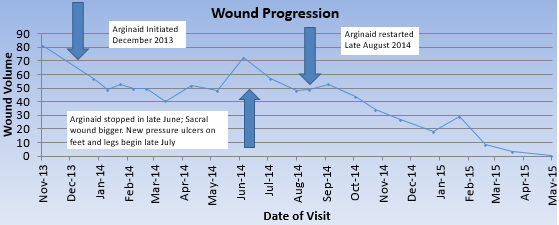What you put IN the patient may be as important as what you put ON them
I have been focusing more on nutrition with my patients. Nutrition support and correction of nutritional deficiencies is critical to wound healing. Arginine, a conditionally essential amino acid, serves as a substrate for protein synthesis, and is a precursor to nitric oxide (NO) and proline production–all of which play a role in wound healing.
A few years ago I learned about the benefit of Arginine with an 84 year old woman who was bedbound with dementia but being cared for lovingly at home by her daughters. He had developed a very large sacral pressure sore that went to the bone and was about the size of a salad plate. She had a lot of unintentional weight loss and an Albumin of 2.3 g/dL.
I suggested her family supplement her with Arginaid®, which they initiated December. Her wound began to granulate and close. They ran out of Arginaid® in late June and the wound began to get worse again. I had the family restart it in August because by then she was also developing a deep tissue injury on the calf and small lesions on her hands and feet. The smaller ulcers resolved quickly and the large sacral ulcer healed by the following May.
Here’s a graph that plots her course on and off Arginaid:


Join me for a breakfast symposium about the role of nutrition in wound healing on Saturday September 9, at the upcoming APWCA meeting. I will be discussing how practitioners can avoid losing 4% of their Medicare Part B payments by performing a Clinical Practice Improvement Activity (IA) focused on nutritional screening of patients with wounds, and prescribing appropriate supplements.
http://www.apwca.org/2017-Overview
Arginaid® can be hard to find, but patients can order it to be sent directly to their home at DirectPatient: https://directpatient.com/nutrition

Dr. Fife is a world renowned wound care physician dedicated to improving patient outcomes through quality driven care. Please visit my blog at CarolineFifeMD.com and my Youtube channel at https://www.youtube.com/c/carolinefifemd/videos
The opinions, comments, and content expressed or implied in my statements are solely my own and do not necessarily reflect the position or views of Intellicure or any of the boards on which I serve.



